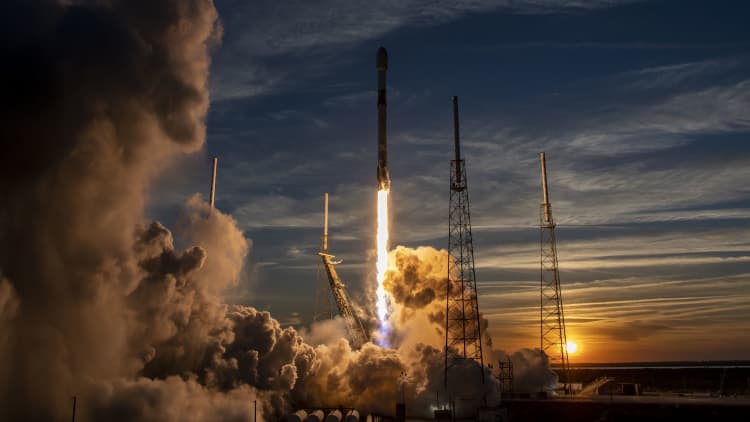[ad_1]
Actress and singer Bridgit Mendler attends NBCUniversal’s after party for the 72nd annual Golden Globes Awards at The Beverly Hilton hotel in Beverly Hills, California, on Jan. 11, 2015.
Paul Archuleta | Filmmagic | Getty Images
Bridgit Mendler is no stranger to reaching millions of people — now she wants to change how satellite data reaches the ground.
A former Disney Channel star and singer — with a filmography including “Good Luck Charlie,” “Wizards of Waverly Place” and “The Clique” — Mendler has spent the past several years studying at the Massachusetts Institute of Technology and Harvard Law School.
By way of her self-described “engineering household” and time at the Federal Communications Commission’s new Space Bureau, where she “completely fell in love with space law,” Mendler is launching a new career in the space industry as CEO of startup Northwood Space, based in El Segundo, California.
“The vision is a data highway between Earth and space,” Mendler told CNBC. “Space is getting easier along so many different dimensions but still the actual exercise of sending data to and from space is difficult. You have difficulty finding an access point for contacting your satellite.”
Rather than build rockets or satellites, Northwood aims to mass produce ground stations. Also known as teleports, ground stations are the typically large and often circular antennas that connect to satellites in space.
Already, Northwood is attracting high-profile venture investors, with about $6 million in initial funding raised from investors including Founders Fund, Andreessen Horowitz and Also Capital.
Mendler is building Northwood with two cofounders: the startup’s chief technology officer, and her husband, Griffin Cleverly, as well as head of software Shaurya Luthra.
Both Cleverly and Luthra spent time at Lockheed Martin as engineers. The former recently spent time at the Mitre Corporation working on communications, and the latter spent nearly four years building the ground station network of satellite imagery venture Capella Space.
The startup’s co-founders, from left: Chief Technology Officer Griffin Cleverly, CEO Bridgit Mendler and Head of Software Shaurya Luthra.
Northwood Space
Northwood’s name stems from a lake in New Hampshire where Mendler said the idea for the company originated while she was spending time with family during the Covid-19 pandemic.
“While everybody else was making their sourdough starters, we were building antennas out of random crap we could find at Home Depot … and receiving data from [National Oceanic and Atmospheric Administration] satellites,” Mendler said.
“For me, why the ground-side matters is because it actually is about bringing the impacts of space home to people,” Mendler added.
Mass producing ground stations
Cleverly emphasized that the space industry’s growth means there is now a “colossal” amount of data trying to travel to and from satellites.
“We need an approach so that those companies can get the data down reliably and in the quantities that they need,” he told CNBC.
Northwood aims to build satellite ground stations that are designed with fast production and deployment flexibility first in mind. Luthra said Northwood wants to deliver ground stations “within days, not months,” so that satellite operators don’t spend time reconfiguring their networks to properly support what’s happening on Earth.
“If you want a dedicated antenna, you have to wait 18 months to get the antenna delivered, installed and built out for you,” Luthra said.
The startup plans to target services for satellites in low Earth orbit initially, for companies that don’t want to spend the money to build their own ground station networks. Northwood is looking to resolve a bottleneck it sees in shared ground stations making it difficult for customers to find availability on existing teleports.
An Amazon Web Services Ground Station satellite antenna at one of the company’s data centers in Boardman, Oregon.
Amazon
“Traditionally, when I wanted an antenna or site to use, I would first have to ask, ‘Do you have availability, or is it already rented out to everyone else in the world?’ A lot of times very key sites were already rented out,” Luthra said.
Northwood aims for its customers to have a similar experience to those that rent server capacity from Amazon Web Services or Microsoft’s Azure — avoiding the capital expenditure of building and operating their own servers.
“It allows space companies to be much more responsive to use cases and missions that pop up,” Cleverly said.
The startup aims to conduct a first test connecting to a spacecraft in orbit later this year.

[ad_2]
Source link



